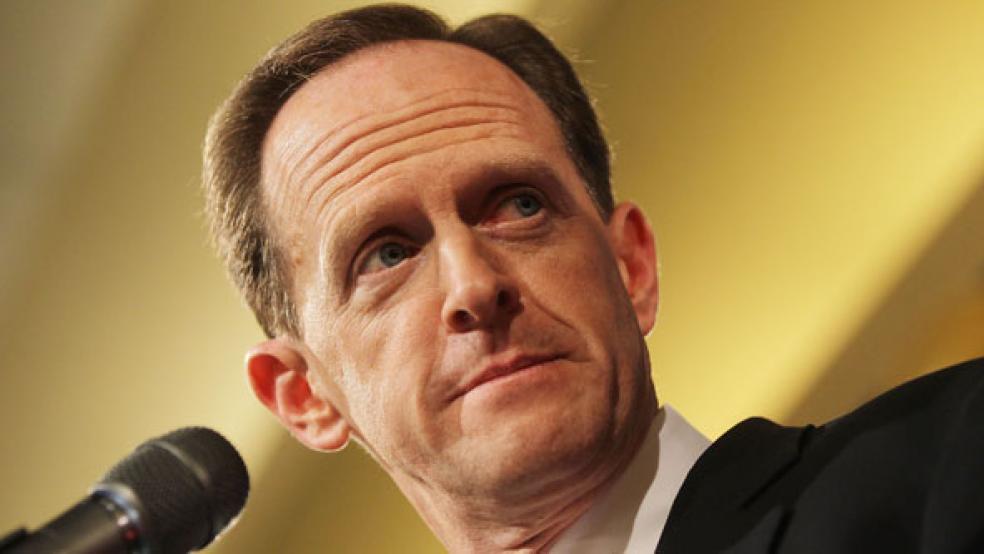Senate Republicans proposed a balanced budget amendment to the U.S. Constitution today which, if ratified, would make recessions worse, violate basic principles of democratic rule, and set up a dramatic clash between the goal of capping annual spending and public support for major domestic programs. The amendment would take effect five years after ratification.
It would require the following:
- A balanced budget every year with a limit on spending to 18 percent of Gross Domestic Product (GDP
- A two-thirds vote of both congressional chambers to raise taxes
- A three-fifths vote of both chambers to raise the debt limit
- A two-thirds or three-fifths vote to waive its various requirements.
Senate GOP leaders have been working to build support for the proposal from their rank-and-file members, and they sent members a one-page description and other documents to explain it. They plan to push it as part of coming negotiations over raising the debt limit.
No one is sure how to enforce such an amendment. Some experts worry that, were policymakers to ignore its requirements, judges could start making decisions about programs to cut and taxes to raise. The Senate GOP proposal would bar judges from ordering tax increases, but John Yoo and Todd Gaziano of the American Enterprise Institute think Congress should go further and bar judges from all fiscal decision-making.
The Senate GOP proposal has far bigger problems than enforcement, however. They come in three categories: economics, fiscal, and democratic.
The economic problem: The amendment not only would prevent policymakers from using fiscal policy to reverse economic downturns (by boosting spending, cutting taxes, or both), it would force them to do the opposite (cut spending, raise taxes, or both). That would make recessions worse. That is precisely what happens in the states, which face their own balanced-budget requirements.
In a recession, the federal government receives less tax revenue from corporations that are earning fewer profits and from people who lose their jobs. The government also spends more on benefits that kick in automatically, such as unemployment compensation. The lower revenue and higher spending turns balanced budgets into deficits.
Since the 1930s, policymakers have used counter-cyclical policy (tax cuts and higher spending) to increase demand in the economy and thereby reignite growth. For both parties, concerns about deficits traditionally take a back seat until the economy returns to robust growth. That was true even during the last recession, when Republicans opposed President Obama’s “stimulus” measure less because it employed Keynesian economics than because it did not rely more on tax cuts.
The fiscal problem: Federal spending has topped 18 percent of GDP every year since 1966 (although just barely in 2000 and 2001 when it was 18.2 percent), according to the Office of Management and Budget’s historical tables. More commonly over the past 40 years, it has hovered between 19 and 23 percent, with no strong correlation between the level of spending and either party’s control of the White House or Congress.
All of that, of course, predated September 11, 2001, which prompted policymakers to launch a “war on terror” and create a category of spending called “homeland security,” neither of which are likely to expire soon. It also predated the retirement of “baby boomers,” which began in 2008 and will greatly boost federal spending on Social Security, Medicare and Medicaid. Meanwhile, health care costs have continued climbing faster than the economy, which will further swell the budgets of Medicare and Medicaid.
Consequently, Social Security rose from 4.2 of GDP in 2001 to 4.8 percent last year, while Medicare rose from 2.3 to 3.6 percent, according to the Congressional Budget Office’s most recent annual report on economic and budget conditions. Both will continue rising as a share of GDP in the future, though Medicare at a much faster rate.
In the pre-recession, pre-stimulus year of 2008, federal spending totaled 20.7 percent of GDP. Reducing it from there to 18 percent – never mind reducing it from today’s 25 percent – would require dramatic cuts in Social Security, Medicare, or Medicaid or, without them, even more dramatic cuts in defense and the rest of government.
Recent polls, such as one released this month by NBC and the Wall Street Journal, show that strong majorities don’t want any cuts in Social Security and Medicare – much less the cuts needed to meet the 18 percent target. The gap between the amendment’s requirements and public attitudes will only widen as Social Security and Medicare grow as shares of GDP, driving up total federal spending.
The democratic argument: Due to the super-majority requirements described above, the amendment would empower a congressional minority of either chamber to block the majority from making basic fiscal choices or even, in the case of raising the debt limit, paying its bills on time.
Put simply, budgets consist of revenues and spending, the former to support the latter. Whether to raise taxes is a fiscal, economic, and perhaps moral decision but, as with any other decision, the majority should rule.
A two-thirds requirement from both chambers to raise taxes would mean that, in either chamber, a minority of just one third plus one member could overrule the wishes of even a strong majority. Less responsible is the requirement for a three-fifths vote of both chambers to raise the debt limit, which would empower a two-fifths-plus-one minority in just one chamber to prevent Congress from raising the debt limit, triggering a catastrophic default that could diminish America’s power forever.
Problems with super-majorities are on display every day in the Senate. The abuse of Senate filibuster procedures by both parties in recent years has empowered the minority, as long as it has at least 40 members, to block anything. The last thing we need is even more minority empowerment.
More broadly, the last thing we need is a constitutional amendment with such problems for our economy, our government, and our democracy.
Related Links:
All 47 GOP Senators Co-sponsor Balanced Budget Amendment (Spartanburg Tea Party)
Republicans Want to Mandate Balanced U.S. Budget (Reuters)
Balanced Budget Amendment “Irresponsible” (CNN)






